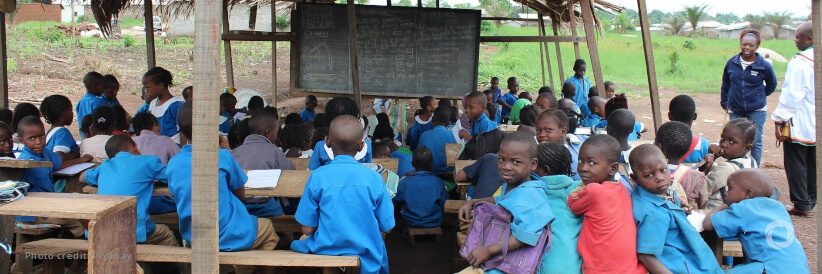Intensifying conflict, inter-community fighting, and resulting displacement are depriving hundreds of thousands of children in Ituri province, eastern Democratic Republic of the Congo (DRC), from obtaining an education, UNICEF warned.
More than 290 schools have been damaged or destroyed this year, preventing an additional 130,000 children from attending lessons. This brings the province’s total number of out-of-school children to over 1.3 million.
Between January and April 2025, the latest surge in violence in Ituri has displaced more than 100,000 people, half of whom are children. During the same four months, at least 205 people were killed, and grave violations against children – including cases of abduction, maiming, sexual violence, and recruitment and use by armed groups – increased by 32 per cent compared to the same period a year ago.
“Since the outset, we’ve been calling the crisis in eastern DRC a protection crisis,” said John Agbor, UNICEF Representative in the DRC. “But it’s evident that this is also an education emergency. In Ituri, violence and conflict are shattering children’s right to learn – putting them at a far greater risk of being recruited by armed groups, exploited, and abused.”
Across eastern DRC – including Ituri, North Kivu, South Kivu, and Tanganyika provinces – the number of conflict-affected children who are out of school exceeds 1.8 million.
UNICEF remains on the ground in Ituri, providing emergency assistance and supporting community resilience. Since January 2025, UNICEF and its partners have helped 267 children formerly associated with armed groups reintegrate into their communities, including 130 girls. Over 23,800 children have received mental health and psychosocial support through child-friendly spaces, and nearly 900 survivors of sexual violence have received a comprehensive package of care, including medical treatment, psychological support, access to education, and socio-economic reintegration. But without urgent additional funding, these efforts are at risk.
“We are doing everything we can to respond to the crisis, but the needs are immense, and our resources are not enough,” Agbor added. “Investing in long-term solutions that prioritize early learning, alternative education systems for displaced and out-of-school children, mental health and psychological support, and basic health services is fundamental. These are not luxuries. These are what give children a chance to grow up in dignity and safety and to fulfil their potential.”
Preschool education remains particularly underdeveloped in the province, with only 4 per cent of children aged 3 to 5 enrolled in early learning programmes, depriving many of the foundations for lifelong development. Chronic malnutrition further deepens the crisis, with more than half of children under five affected. In 2024, UNICEF treated over 18,600 children with severe acute malnutrition in Ituri. In 2025, the goal is to reach over 38,700 children, but only one-third of health zones currently have functioning nutrition services, largely due to a lack of funding.
UNICEF has launched an appeal for US$57 million to respond to the crisis in eastern DRC. So far, US$35.6 million has been mobilized, leaving a funding gap of US$22 million.

